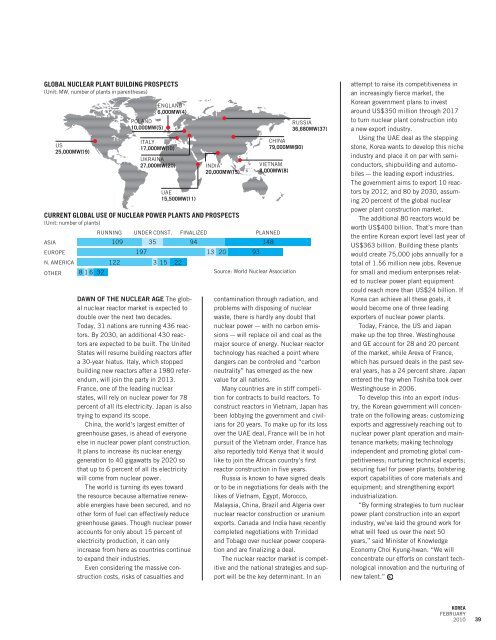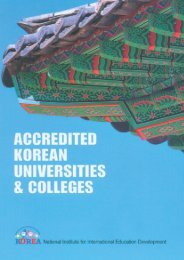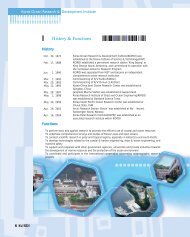www.korea.net
KOREAN MOVIES - Korea.net
KOREAN MOVIES - Korea.net
- No tags were found...
Create successful ePaper yourself
Turn your PDF publications into a flip-book with our unique Google optimized e-Paper software.
GLOBAL NUCLEAR PLANT BUILDING PROSPECTS<br />
(Unit: MW, number of plants in parentheses)<br />
CURRENT GLOBAL USE OF NUCLEAR POWER PLANTS AND PROSPECTS<br />
(Unit: number of plants)<br />
ASIA<br />
US<br />
25,000MW(19)<br />
RUNNING UNDER CONST. FINALIZED PLANNED<br />
109 35 94<br />
148<br />
EUROPE 197 13 20 93<br />
N. AMERICA 122 3 15 22<br />
OTHER 816 32<br />
POLAND<br />
10,000MW(5)<br />
ENGLAND<br />
6,000MW(4)<br />
ITALY<br />
17,000MW(10)<br />
UKRAINA<br />
27,000MW(20)<br />
UAE<br />
15,500MW(11)<br />
DAWN OF THE NUCLEAR AGE The global<br />
nuclear reactor market is expected to<br />
double over the next two decades.<br />
Today, 31 nations are running 436 reactors.<br />
By 2030, an additional 430 reactors<br />
are expected to be built. The United<br />
States will resume building reactors after<br />
a 30-year hiatus. Italy, which stopped<br />
building new reactors after a 1980 referendum,<br />
will join the party in 2013.<br />
France, one of the leading nuclear<br />
states, will rely on nuclear power for 78<br />
percent of all its electricity. Japan is also<br />
trying to expand its scope.<br />
China, the world’s largest emitter of<br />
greenhouse gases, is ahead of everyone<br />
else in nuclear power plant construction.<br />
It plans to increase its nuclear energy<br />
generation to 40 gigawatts by 2020 so<br />
that up to 6 percent of all its electricity<br />
will come from nuclear power.<br />
The world is turning its eyes toward<br />
the resource because alternative renewable<br />
energies have been secured, and no<br />
other form of fuel can effectively reduce<br />
greenhouse gases. Though nuclear power<br />
accounts for only about 15 percent of<br />
electricity production, it can only<br />
increase from here as countries continue<br />
to expand their industries.<br />
Even considering the massive construction<br />
costs, risks of casualties and<br />
INDIA<br />
20,000MW(15)<br />
CHINA<br />
79,000MW(90)<br />
VIETNAM<br />
8,000MW(8)<br />
Source: World Nuclear Association<br />
RUSSIA<br />
36,680MW(37)<br />
contamination through radiation, and<br />
problems with disposing of nuclear<br />
waste, there is hardly any doubt that<br />
nuclear power — with no carbon emissions<br />
— will replace oil and coal as the<br />
major source of energy. Nuclear reactor<br />
technology has reached a point where<br />
dangers can be controled and “carbon<br />
neutrality” has emerged as the new<br />
value for all nations.<br />
Many countries are in stiff competition<br />
for contracts to build reactors. To<br />
construct reactors in Vietnam, Japan has<br />
been lobbying the government and civilians<br />
for 20 years. To make up for its loss<br />
over the UAE deal, France will be in hot<br />
pursuit of the Vietnam order. France has<br />
also reportedly told Kenya that it would<br />
like to join the African country’s first<br />
reactor construction in five years.<br />
Russia is known to have signed deals<br />
or to be in negotiations for deals with the<br />
likes of Vietnam, Egypt, Morocco,<br />
Malaysia, China, Brazil and Algeria over<br />
nuclear reactor construction or uranium<br />
exports. Canada and India have recently<br />
completed negotiations with Trinidad<br />
and Tobago over nuclear power cooperation<br />
and are finalizing a deal.<br />
The nuclear reactor market is competitive<br />
and the national strategies and support<br />
will be the key determinant. In an<br />
attempt to raise its competitiveness in<br />
an increasingly fierce market, the<br />
Korean government plans to invest<br />
around US$350 million through 2017<br />
to turn nuclear plant construction into<br />
a new export industry.<br />
Using the UAE deal as the stepping<br />
stone, Korea wants to develop this niche<br />
industry and place it on par with semiconductors,<br />
shipbuilding and automobiles<br />
— the leading export industries.<br />
The government aims to export 10 reactors<br />
by 2012, and 80 by 2030, assuming<br />
20 percent of the global nuclear<br />
power plant construction market.<br />
The additional 80 reactors would be<br />
worth US$400 billion. That’s more than<br />
the entire Korean export level last year of<br />
US$363 billion. Building these plants<br />
would create 75,000 jobs annually for a<br />
total of 1.56 million new jobs. Revenue<br />
for small and medium enterprises related<br />
to nuclear power plant equipment<br />
could reach more than US$24 billion. If<br />
Korea can achieve all these goals, it<br />
would become one of three leading<br />
exporters of nuclear power plants.<br />
Today, France, the US and Japan<br />
make up the top three. Westinghouse<br />
and GE account for 28 and 20 percent<br />
of the market, while Areva of France,<br />
which has pursued deals in the past several<br />
years, has a 24 percent share. Japan<br />
entered the fray when Toshiba took over<br />
Westinghouse in 2006.<br />
To develop this into an export industry,<br />
the Korean government will concentrate<br />
on the following areas: customizing<br />
exports and aggressively reaching out to<br />
nuclear power plant operation and maintenance<br />
markets; making technology<br />
independent and promoting global competitiveness;<br />
nurturing technical experts;<br />
securing fuel for power plants; bolstering<br />
export capabilities of core materials and<br />
equipment; and strengthening export<br />
industrialization.<br />
“By forming strategies to turn nuclear<br />
power plant construction into an export<br />
industry, we’ve laid the ground work for<br />
what will feed us over the next 50<br />
years,” said Minister of Knowledge<br />
Economy Choi Kyung-hwan. “We will<br />
concentrate our efforts on constant technological<br />
innovation and the nurturing of<br />
new talent.”<br />
KOREA<br />
FEBRUARY<br />
2010<br />
39
















